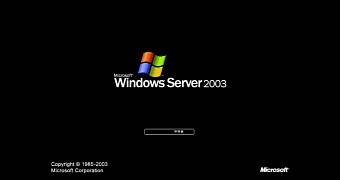After Windows XP, whose support officially ended on April 8, 2014, Microsoft is getting ready to kill off another Windows version, this time specifically aimed at businesses.
Windows Server 2003 reaches end of support on July 14, so the software giant will officially roll out the latest batch of updates tomorrow as part of this monthly Patch Tuesday cycle. After that, customers who are still using it could become vulnerable to attacks in case unpatched security holes are found in the operating system, as Microsoft will no longer fix them.
As was the case with Windows XP, custom support for Windows Server 2003 will also be offered, but needless to say, it comes at a price. The exact cost of extended support is not available, but for Windows XP, companies had to pay approximately $200 for each PC in the first 12 months after EOS.
Plenty of companies still using it
Unsurprisingly, the world isn’t yet ready to give up on Windows Server 2003, and a study conducted by Dell shows that no less than 20 percent of Australian and New Zealand businesses will still be running this OS version on their servers tomorrow, when support comes to an end.
"Customers are in a position where a lot of them are going to be living with Windows Server 2003, without Microsoft support, and that places them into some level of risk around security compliance, auditing, and just around being able to support their environments," Dean Gardiner, Dell datacentre and cloud practice lead, told ZDNet.
What’s more, 23 percent of the businesses claimed they had absolutely no reason to upgrade, while 40 percent of those who are still running Windows Server 2003 explained that they delayed the upgrade because of application support requirements. 29 percent pointed to the final price of the process as the main reason for sticking to WS 2003.
With WPC 2015 to debut today, expect Microsoft to talk a lot about this important milestone that’s being reached tomorrow, especially as many assume that Windows Server 2003 machines will become the main target for hackers in the next few months.

 14 DAY TRIAL //
14 DAY TRIAL //